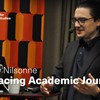retain
Consequentialism and Robust Goods
Utilitas, 1–9, doi:10.1017/S0953820819000116 Abstract In this article, I critique the moral theory developed in Philip Pettit’s The Robust Demands of the Good: Ethics with Attachment, Virtue, and Respecvirtue and respect. I argue that Robust-Goods Consequentialism fails because it implies very implausible value judgements.
(Re)centralizing Tendencies within Health Care Services. Implementation of a New Idea?
Decentralization has for many years been a widespread trend in health care sectors throughoutEurope, but some implications of ambitions for states to regain control can be seen. This paper examines wh
Can AI be used to avoid discrimination during recruitment?
More and more businesses use AI – artificial intelligence – in recruitment. But what happens when they do so? The research project Can the implementation of artificial intelligence in the recruitment p, led by sociologist Moa Bursell, can give us some answers.
Mistake is to Myth What Pretense is to Fiction: A Reply to Goodman.
Philosophia 45(3): 1275–1282. https://doi.org/10.1007/s11406-017-9812-5. Abstract In this reply I defend Kripke’s creationist thesis for mythical objects (Reference and Existence, 2013) against Jeffrey Go). I argue that Goodman has mistaken the basis for when mythical abstracta are created. Contrary to Goodman I show that, as well as how, Kripke’s theory consistently retains the analogy between creation of mythical objects and creation of fictional objects, while also explaining in what way they differ.
Usability of climate information: Toward a new scientific framework
WIREs Climate Change Abstract Climate science is expected to provide usable information to policy-makers, to support the resolution of climate change. The complex, multiply connected nature of climate c
After the algorithms: A study of meta-algorithmic judgments and diversity in the hiring process at a large multisite company
Big Data & Society Abstract In recent years, both private and public organizations across contexts have begun implementing AI technologies in their recruitment processes. This transition is typicall

Gustav Nilsonne: Pathways to an Open Science System. Replacing Academic Journals
Open science enables cumulative knowledge and facilitates discovery. The transition to an open science system is underway, but important roadblocks remain. A decentralised, evolvable network of platfo
Social Assistance dynamics in Sweden: Duration dependence and heterogeneity
Social Science Research (2012) http://dx.doi.org/10.1016/j.ssresearch.2012.07.005 Abstract This article uses data on all persons who ever received Social Assistance (SA) in Sweden 1991–2007 (N = 2,638,68
Gustav Nilsonne: Pathways to an open science system: Replacing academic journals
Venue: Institutet för framtidsstudier, Holländargatan 13, 4th floor, Stockholm, and onlineREGISTERResearch seminar with Gustav Nilsonne, Associate Professor of neuroscience. He is active in meta-sciencOpen science enables cumulative knowledge and facilitates discovery. The transition to an open science system is underway, but important roadblocks remain. A decentralised, evolvable network of platforms interconnected by open standards, and governed by the scientific community, is technically feasible. However, academic researchers remain tied to traditional journals not least because assessment of merit is tied to the venue of publication. Ways forward can include redirection of funding from legacy publishing models to new infrastructure and the development of new methods to assess scientific contributions. Concerted action by stakeholders needs to be combined with pluralistic experimentation on policies and interventions to further open science practices.
Completed: Sequences of Democratization
Why do some democratic transitions succeed and others do not? We attempt to identify which sequences lead to full and stable democracy and which sequences do not.








